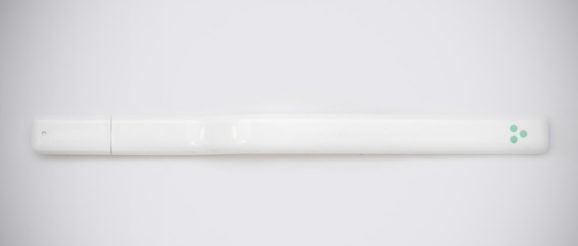Device that uses saliva to predict heart failure developed – Med-Tech Innovation | Latest news for the medical device industry

An early design of the diagnostic stick to be further developed and ready for market by 2021.
A multi-partner deal has been signed to bring the technology to market. It contains nano-sensors on the tip of the diagnostic stick to measure heart disease biomarkers from saliva to predict the risk of heart disease, failure or heart attack, then warn users via an app.
The collaboration is being led by an Australian start-up based in Melbourne called ESN Cleer, with RMIT University and the Innovative Manufacturing Cooperative Research Centre (IMCRC) researching and developing the device for pilot manufacture, with expectations it will hit market by 2021.
ESN Cleer CEO, Leopoldt de Bruin, said the collaboration represented some of the best minds in medical device innovation, design and manufacture.
De Bruin said: “We’re really pleased to be able to bring these strands together in addressing such a major global health challenge.
“Of the 400 million people who suffer from cardiovascular disease globally, only 16% of cases are due to genetic traits. This underlines how much room there is to improve on screening and prevention, which is where this device could have such an impact.”
Cardiovascular disease currently accounts for nearly one-third of all global disease deaths each year. It is hoped the device will be able to predict cancer risk in the future.
Research co-director of RMIT’s Functional Materials and Microsystems Research Group, Professor Sharath Sriram, said this was the first portable heart disease test with such high levels of accuracy.
The sensing technology, developed at RMIT’s MicroNano Research Facility, was validated in the lab to measure biomarker concentrations a thousand times more precisely than levels in human body fluids.
Sriram said: “This marks a big step forward in technology for screening.
“Often, blood tests are only conducted after a heart failure episode. Such reactive testing is too late, leaving people with debilitating illness or leading to deaths.
“Prevention is always better than cure, which is where this technology comes in, adding accurate prediction to the mix.”
The IMCRC funding, which matches contributions from ESN Cleer, is enabling a $3.5 million project investment into addressing the challenge of manufacturing and large-scale production of the diagnostic swabs.
David Chuter, CEO and managing director at the IMCRC: “Utilising advanced materials and adopting high-precision, automated manufacturing processes will allow the swabs to be high value and at a competitive cost.”
